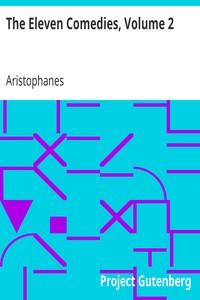Read this ebook for free! No credit card needed, absolutely nothing to pay.
Words: 87420 in 73 pages
This is an ebook sharing website. You can read the uploaded ebooks for free here. No credit cards needed, nothing to pay. If you want to own a digital copy of the ebook, or want to read offline with your favorite ebook-reader, then you can choose to buy and download the ebook.


: The Eleven Comedies Volume 1 by Aristophanes BCE BCE - Comedies; Greek drama (Comedy) Translations into English; Athens (Greece) Drama; Aristophanes Translations into English Classical Antiquity
OF THE FIRST VOLUME
Translator's Foreword Authorities
THE KNIGHTS Introduction Text And Notes
THE ACHARNIANS Introduction Text And Notes
PEACE Introduction Text And Notes
LYSISTRATA Introduction Text And Notes
THE CLOUDS Introduction Text And Notes
INDEX
Translator's Foreword
"It is difficult to compare the Aristophanic Comedy to any one form of modern literature, dramatic or other. It perhaps most resembles what we now call burlesque; but it had also very much in it of broad farce and comic opera, and something also of the modern pantomime. But it was something more, and more important to the Athenian public than any or all of these could have been. Almost always more or less political, and sometimes intensely personal, and always with some purpose more or less important underlying its wildest vagaries and coarsest buffooneries, it supplied the place of the political journal, the literary review, the popular caricature and the party pamphlet, of our own times. It combined the attractions and influence of all these; for its grotesque masks and elaborate 'spectacle' addressed the eye as strongly as the author's keenest witticisms did the ear of his audience."
At the same time we must not be misled by the word 'Comedy' to bring Aristophanes' work into comparison with what we call Comedy now. This is quite another thing--confined to a representation of incidents of private, generally polite life, and made up of the intrigues and entanglements of social and domestic situations. Such a Comedy the Greeks did produce, but at a date fifty or sixty years subsequent to Aristophanes' day, and recognized by themselves as belonging to an entirely different genre. Hence the distinction drawn between 'The Old Comedy,' of which Cratinus and his younger contemporaries, Eupolis and Aristophanes, were the leading representatives, and which was at high-water mark just before and during the course of the great struggle of the Peloponnesian War, and 'The New Comedy,' a comedy of manners, the two chief exponents of which were Philemon and Menander, writing after Athens had fallen under the Macedonian yoke, and politics were excluded altogether from the stage. Menander's plays in turn were the originals of those produced by Plautus and Terence at Rome, whose existing Comedies afford some faint idea of what the lost masterpieces of their Greek predecessor must have been. Unlike the 'Old,' the 'New Comedy' had no Chorus and no 'Parabasis.'
This remarkable and distinctive feature, by-the-bye, of the Old Comedy, the 'Parabasis' to wit, calls for a word of explanation. It was a direct address on the Author's part to the audience, delivered in verse of a special metre, generally towards the close of the representation, by the leader of the Chorus, but expressing the personal opinions and predilections of the poet, and embodying any remarks upon current topics and any urgent piece of advice which he was particularly anxious to insist on. Often it was made the vehicle for special appeal to the sympathetic consideration of the spectators for the play and its merits. These 'parabases,' so characteristic of the Aristophanic comedy, are conceived in the brightest and wittiest vein, and abound in topical allusions and personal hits that must have constituted them perhaps the most telling part of the whole performance.
Free books android app tbrJar TBR JAR Read Free books online gutenberg
More posts by @FreeBooks


: Memoirs of Henry Hunt Esq. — Volume 1 by Hunt Henry - Hunt Henry 1773-1835; Social reformers Great Britain Biography






